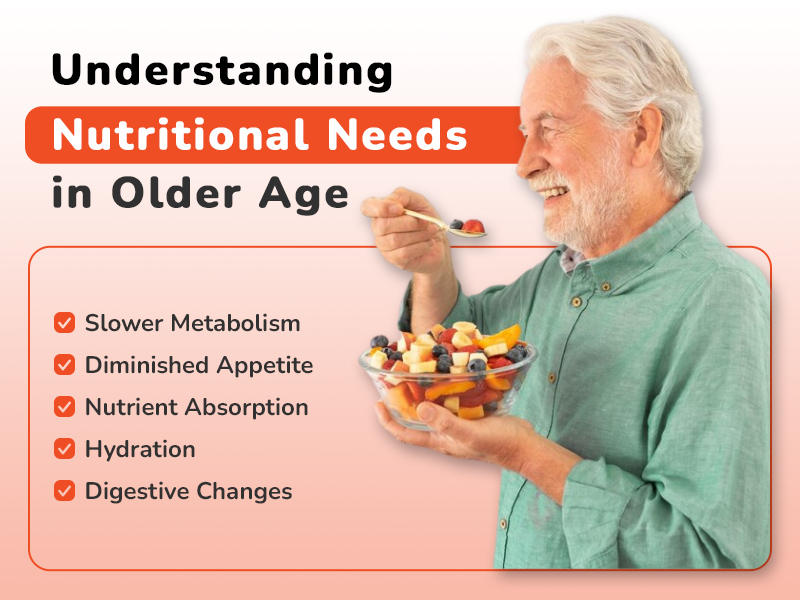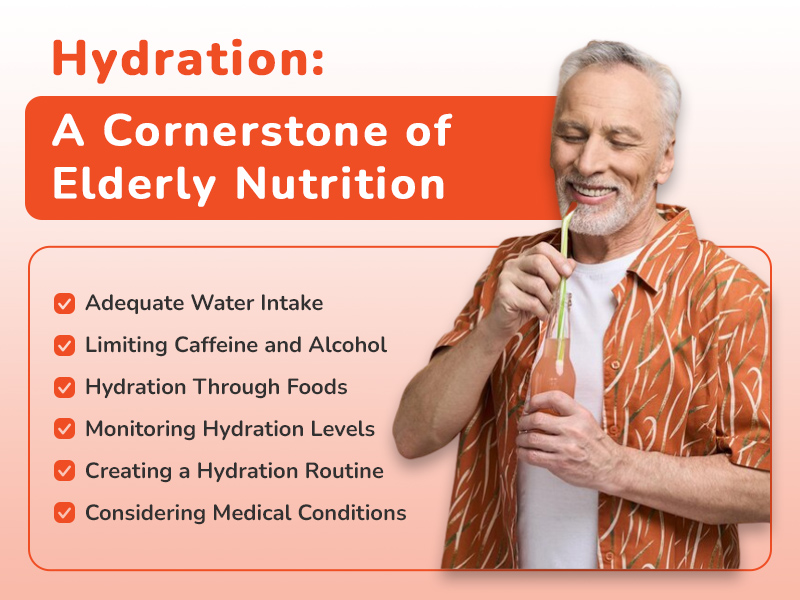As we age, our bodies undergo significant changes that impact our nutritional requirements. Adapting to these shifts is crucial for maintaining health and vitality in the golden years. This article guides seniors and caregivers, offering insights into adjusting diets to meet evolving nutritional needs. It aims to simplify this transition by providing practical advice, dietary recommendations, and tips to ensure seniors thrive. Whether you’re a senior refining your dietary habits or a caregiver seeking guidance, this guide will support you in achieving optimal nutrition and wellness during the later stages of life.
Understanding Nutritional Needs in Older Age
As individuals transition into their senior years, their bodies undergo transformations that significantly affect nutritional requirements. Here’s how:

- Slower Metabolism: One of the most noticeable changes is the slowing down metabolism. This natural progression means the body requires fewer calories than it did in younger years.
- Diminished Appetite: Seniors often experience changes in taste and smell, leading to reduced appetite. This decreased appetite makes it challenging to maintain a balanced diet and can lead to nutritional deficiencies if not managed properly.
- Nutrient Absorption: Aging affects the body’s ability to absorb certain nutrients effectively. For instance, the capacity to absorb vitamin B12, a crucial nutrient for maintaining nerve function and blood cells, diminishes with age.
- Hydration: Older adults also tend to experience a reduced sense of thirst, increasing the risk of dehydration. Staying adequately hydrated is crucial, as dehydration can exacerbate health issues and impact overall well-being.
- Digestive Changes: The digestive system becomes less efficient in the elderly, impacting how food is processed, and nutrients are absorbed. This can lead to gastrointestinal issues and affects the body’s ability to utilize the nutrients from food.
Key Nutritional Components for Older Adults
As we age, our bodies require specific nutrients to maintain health and functionality. Here are some of the key nutritional components that should be a staple in the diet of older adults:
- Proteins: Proteins are the building blocks of muscle, and maintaining muscle mass is crucial for seniors. With age-related muscle loss (sarcopenia) being a concern, a protein-rich diet is essential. Opt for lean meats, poultry, and fish.
- Calcium and Vitamin D: Both are vital for maintaining strong bones and preventing osteoporosis, a common concern in the elderly. Dairy products like milk, cheese, and yoghurt are rich in calcium. For lactose intolerant or vegan, leafy greens like kale and spinach and fortified plant-based milk and juices are great alternatives.
- Fiber: A high-fiber diet is crucial for aiding digestion and preventing constipation, a common issue in older adults. Fibre-rich foods include whole grains, fruits, vegetables, and legumes. These foods aid digestion, help maintain a healthy weight, and lower the risk of heart disease.
- Omega-3 Fatty Acids: Omega-3s are vital for heart and brain health, two areas of significant concern as we age. They help reduce inflammation, lower the risk of chronic diseases, and maintain cognitive function.
- Antioxidants: Foods rich in antioxidants can help combat the effects of ageing by reducing oxidative stress and inflammation. Berries, nuts, dark chocolate, and green tea are packed with antioxidants.
- Hydration: Adequate fluid intake is crucial. Water, herbal teas, and hydrating fruits and vegetables like cucumbers and oranges can help maintain hydration.
Hydration: A Cornerstone of Elderly Nutrition
Hydration plays a pivotal role in maintaining the health of elderly individuals. As we age, our bodies’ ability to conserve water decreases and the sense of thirst may not be as sharp. Here’s why proper hydration is essential and how to achieve it:

- Adequate Water Intake: It’s commonly advised to drink about eight 8-ounce glasses of water per day, roughly 2 litres, or half a gallon. This is known as the 8×8 rule and is easy to remember. However, the exact amount can vary based on individual health, level of activity, and climate.
- Limiting Caffeine and Alcohol: Both caffeine and alcohol have diuretic effects, meaning they increase urine production, which can lead to dehydration if not counterbalanced with water intake. Seniors should be mindful of their consumption of coffee, tea, and alcoholic beverages.
- Hydration Through Foods: Besides drinking water, seniors can also get fluids from various foods, particularly fruits and vegetables. Foods like watermelon, cucumber, oranges, and strawberries have high water content and can contribute significantly to overall hydration.
- Monitoring Hydration Levels: One simple way to monitor hydration is by paying attention to urine colour. Light and clear urine typically indicate proper hydration, while dark-coloured urine can indicate dehydration. Caregivers and seniors themselves should keep an eye on this as a regular check.
- Creating a Hydration Routine: Setting a routine can help ensure adequate daily water intake. This can include drinking a glass of water upon waking, with each meal, and before bed. Carrying a water bottle when going out and setting reminders can also be helpful strategies.
- Considering Medical Conditions: Some seniors may have medical conditions or take medications that affect their fluid needs. It’s important to consult with healthcare providers to understand specific hydration requirements based on individual health concerns.
Dietary Considerations for Common Age-Related Conditions
As we age, our bodies become more susceptible to certain health conditions, which can often be managed or alleviated through diet. Understanding how to adjust your diet to accommodate these conditions is crucial:
- Heart Disease: A heart-healthy diet is key for those with heart disease. This means limiting sodium intake, which can contribute to high blood pressure, and avoiding unhealthy fats that can increase cholesterol levels. Instead, focus on incorporating lean proteins, whole grains, and a variety of fruits and vegetables.
- Diabetes: Managing blood sugar levels is crucial for those with diabetes. This involves monitoring carbohydrate intake and choosing complex carbs over simple sugars. Complex carbs, found in whole grains, legumes, and certain fruits, are absorbed more slowly and have less of an immediate impact on blood sugar. Regularly monitoring blood glucose levels can also guide dietary choices.
- Osteoporosis: To combat osteoporosis, ensure a diet rich in calcium and vitamin D. Dairy products, leafy green vegetables, and calcium-fortified foods are excellent calcium sources. Vitamin D, which aids in calcium absorption, can be obtained from fatty fish, egg yolks, and fortified foods. Sun exposure also helps the body produce vitamin D.
Read More: Mastering Back Brace Selection and Usage for Optimal Health
Practical Tips for a Balanced Diet

Maintaining a balanced diet can be achieved with a few practical steps:
- Meal Planning: Take time to plan meals. This can help ensure a balanced intake of nutrients and prevent reliance on less nutritious convenience foods.
- Small, Frequent Meals: Smaller, more frequent meals can be easier to manage and aid in better digestion and nutrient absorption. This is especially beneficial for those with a reduced appetite or digestive issues.
- Colourful Plates: Including various colours on your plate usually means a good range of nutrients. Fruits and vegetables of different colours provide an array of vitamins, minerals, and antioxidants.
- Consultation with a Dietitian: A dietitian can offer personalized advice and meal plans tailored to individual health needs, preferences, and any specific medical conditions.
Overcoming Dietary Challenges in Older Age
Adapting to dietary challenges can make a significant difference:
- Difficulty Chewing: For those with dental issues or difficulty chewing, softer foods like stews, braised meats, or steamed vegetables can be easier to manage. Blending foods into soups or smoothies is another option.
- Reduced Mobility: For seniors with limited mobility, meal delivery services can be a convenient way to access healthy meals. Alternatively, stocking up on easy-to-prepare, nutritious foods can minimize the need for frequent shopping trips.
- Medication Interactions: Some medications can affect appetite or how the body absorbs nutrients. It’s important to discuss these potential interactions with a healthcare provider.
The Role of Supplements
Supplements can be a valuable addition to a senior’s diet, especially when meeting all nutritional needs through food alone becomes challenging.
- Filling Nutritional Gaps: As we age, our bodies may not absorb nutrients as efficiently, or dietary restrictions can lead to gaps in essential nutrients.
- Tailored Supplementation: Every individual’s needs are different. Additional supplements like omega-3 fatty acids for heart health or fibre supplements for digestive wellness might be beneficial for some seniors.
- Medical Advice is Key: Consulting with a healthcare provider before taking supplements is crucial. They can advise on which supplements are necessary based on medical history, current health status, and any medications being taken.
- Quality and Dosage: Choosing high-quality supplements and adhering to the recommended dosage is important. Over-supplementing can be harmful, and the quality of the product can significantly impact its effectiveness and safety.
- Monitoring and Adjustment: A healthcare professional must regularly monitor supplement types and dosages as health conditions change.
Staying Social with Meals
Mealtime for seniors can offer much more than just the intake of food; it can be a moment of social engagement and joy:
- Community Eating: Attending community meals at local centres or social events is a great way to connect with others.
- Cooking with Family: Inviting family members to prepare meals can transform cooking into a fun, collaborative activity.
- Shared Cooking Classes: Participating in cooking classes designed for seniors can be educational and social.
- Potluck Dinners: Organizing or participating in potluck dinners with friends or neighbours can be a delightful way to share homemade meals.
- Dining Clubs or Groups: Joining a dining club or group that visits different restaurants or holds regular meal gatherings can offer a sense of adventure and camaraderie.
Conclusion
Adopting a balanced and mindful approach to nutrition is crucial for ageing healthily. By understanding and addressing the unique dietary needs of older adults, we can help ensure their continued health, vitality, and enjoyment of life.




